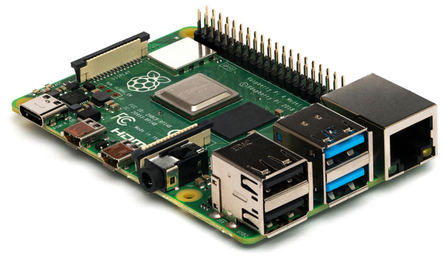How AI development with Raspberry Pi 4 Empowers IoT ApplicationsPosted by OodlesAI on March 17th, 2020 The blend of Artificial intelligence (AI) and the Internet of Things (IoT) are opening new business frontiers. With technological achievements such as the Raspberry Pi computing models, we are witnessing significant expansion in AI potential for businesses. From automated video analytics to AI-infused assistants, AI development with Raspberry Pi 4 is heralding breakthrough applications across verticles. Let’s deeply analyze how Raspberry Pi 4 is providing for a great catalyst for artificial intelligence services to build dynamic applications. Unlocking the Features of Raspberry Pi 4The release of the Raspberry Pi series of single-board computers has completely revolutionized the software development space. After the remarkable performance of Raspberry Pi Zero and its successors, Raspberry Pi 4 has hit the market with improved architecture.
The Raspberry Pi 4 SoC witnessed an upgrade from Cortex A53 chips to a Cortex A 72 SoC which is a major performance booster supported by a USB 3.0 port. The system is powered by 4 GB RAM with dual 4k display output at 30fps, making it a strong replacement of a viable home theatre setting. With a pre-installed Linux-based OS called NOOBS, Pi 4 is poised to accelerate the development of the following applications- a) Video streaming and creation of stop motion movies b) Smart Surveillance models c) Home Automation systems d) Retro Gaming machines, and more However, the most disruptive applications of Raspberry Pi 4 comes with machine learning. From chatbots to object detection, AI development with Raspberry Pi 4 expands the horizons of machine learning development services across businesses. Let’s explore some of these. IoT Applications and AI Development with Raspberry Pi 41) In-Depth Image and Video AnalyticsAdvancements in machine learning algorithms have propelled the development of deep image processing and video analytics applications. AI’s computer vision technologies are breaking new grounds with facial recognition, object detection, and real-time video surveillance models. Though previous Raspberry Pi series ran cloud-based image processing models, Pi 4’s 64-bit quad-core processor can also train AI models at the edge efficiently. However, in the face of memory and compute restraints, it is advisable to use a cloud’s computational powers to deploy ML models such as- a) Image ClassificationAssigning specific labels to the image or video frame. The application requires coding the Raspberry Pi’s camera to capture images and record videos. Image labeling is emerging as an effective automation tool to monitor workplace activities, manufacturing cycles, and construction sites. b) Object DetectionRecognizing objects by creating bounding boxes in an image. It requires trained datasets to run image processing operations on Raspberry Pi using its GPU. Object detection models enable retail, warehousing, and security businesses to automate critical operations effectively. c) Video AnalyticsBy installing open-source libraries like TensorFlow on Raspberry Pi, businesses can train deep video analytics models for several use cases. At Oodles, we practiced AI development with Raspberry Pi to build a real-time environment monitoring systems for party lounge.
2) Social Medis Bots and AI AssistantsAI-powered chatbots and voice-controlled AI assistants are one of the most impactful AI developments. However, it requires complex Natural Language Processing (NLP) algorithms to run across heavy AI and ML models. Raspberry Pi’s compact architecture has accelerated the development of social media and voice-based assistant bots. A Python-based code on the Pi and an active Twitter account are the pre-requisites for creating a Twitter bot that a) Automates business interactions and engages online users b) Augments upselling efforts by pitching relevant business services to the target audience c) Enhances customer experience with accurate and quick responses For AI assistants, businesses can use cloud-based Google SDKs to run voice-controlled assistant on the Pi. From home automation systems to routine user queries, AI development with Raspberry Pi 4 can be used for dynamic applications. Optimizing AI Development with Raspberry Pi 4 at OodlesRaspberry Pi is a giant leap in the software development space. At Oodles, we are exploring the potential of Raspberry Pi to build AI-infused applications using machine learning and deep learning algorithms. Our team has experiential knowledge in training ML models with unstructured and structured data sets while ensuring low latency and maximum output. Our AI development team is skilled at annotating large volumes of data to train function-specific ML models. We have delivered successful image processing, video analytics, and NLP-based chatbots for diverse business settings across the globe. Reach out to our AI team to learn more about our artificial intelligence services. Like it? Share it!More by this author |



